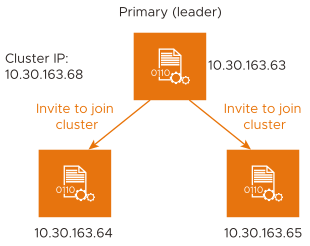Begin with a single NSX Advanced Load Balancer Controller that is already installed and will become the leader node.
Procedure
- Install two new NSX Advanced Load Balancer Controller nodes.
- Select an IP address to use as the Controller Cluster IP address.
For OpenStack deployments, choose one of the following options:
- Pick an unused IP address from the same network to which the Controllers are connected. During clustering, the Controller will automatically create a Neutron port with the Controller cluster IP as a fixed IP address. It ensures that Neutron does not assign that IP address for another purpose.
- Explicitly create a Neutron port and use the IP address assigned to that port as the cluster IP address.
- Use a web browser to navigate to the management IP address of the NSX Advanced Load Balancer Controller that was already installed.
- Navigate to and click Edit. The EDIT CLUSTER pop-up window appears.
- In the Controller Cluster IP field, enter the shared IP address for the Controller cluster.
- Configure the Controller Cluster.
Note:
-
When deploying a Controller Cluster in AWS, enter the Password that was created for the new Controller. For more information, see Changes for Cluster Set-up for AWS Deployments topic in the VMware NSX Advanced Load BalancerInstallation Guide. For deployments in all other environments, the Password can be left blank to use the default initial admin credentials.
-
Public IP is specified for all public clouds.
- After these steps, the incumbent Controller becomes the leader of the cluster and invites the other Controllers to the cluster as follower members. NSX Advanced Load Balancer then performs a warm reboot of the cluster. This process can take 2-3 minutes. The configuration of the leader NSX Advanced Load Balancer Controller node is synchronized to the new follower nodes when the cluster comes online following the reboot.
- The leader NSX Advanced Load Balancer Controller assigns the Controller cluster IP address as a secondary IP address to its management interface.
- For OpenStack deployments, the leader also performs a Neutron API call to set Controller cluster IP address in the list of allowed-address-pairs for the Neutron port corresponding to its management interface.
- To use FQDNs instead of IP address of the Controller nodes, see the following section.
What to do next

The leader Controller assigns the Controller cluster IP address as a secondary IP address to its management interface.
For OpenStack deployments, the leader also performs a Neutron API call to set the Controller cluster IP address in the list of allowed address pairs for the Neutron port corresponding to its management interface.
To use FQDNs instead of IP addresses of controller nodes, see Cluster Configuration with DNS Hostnames.
